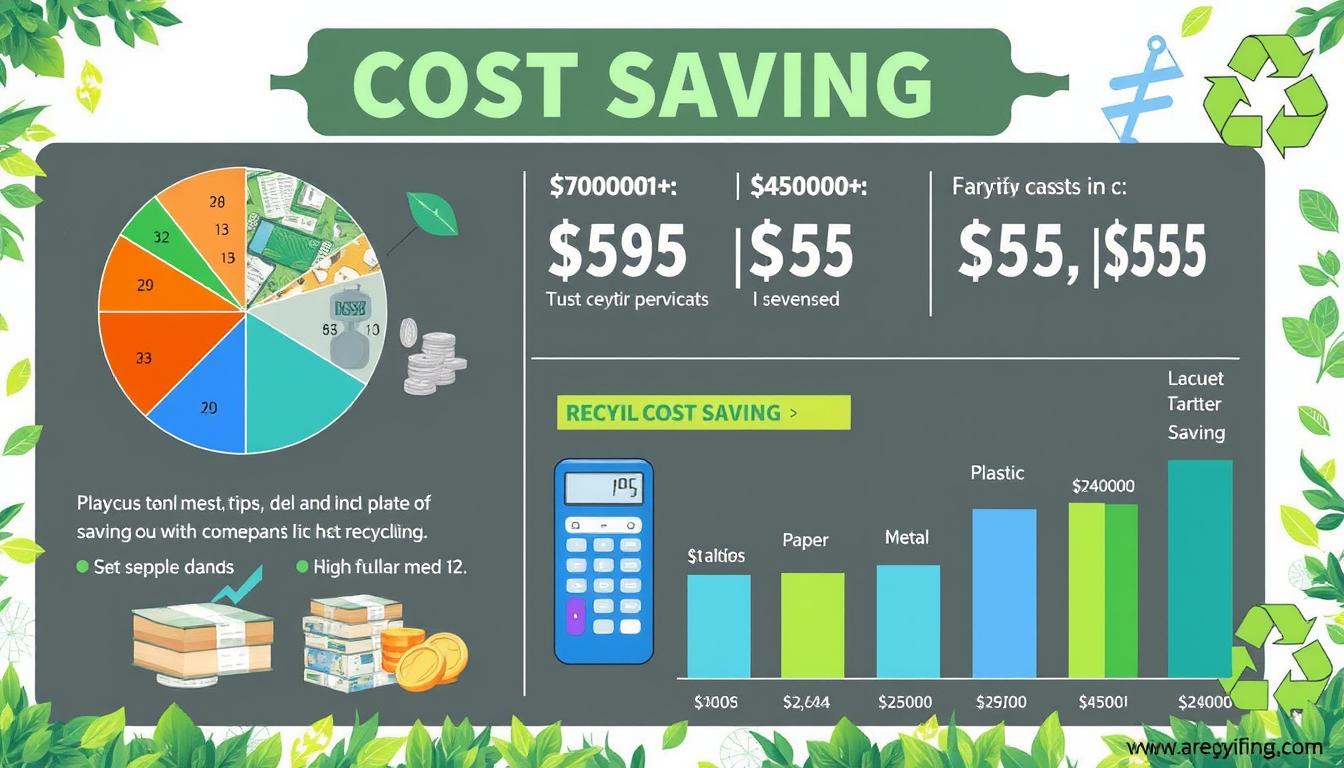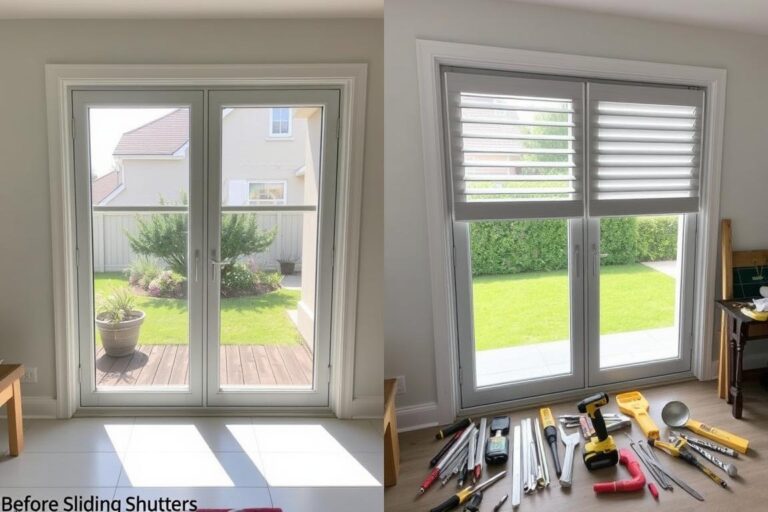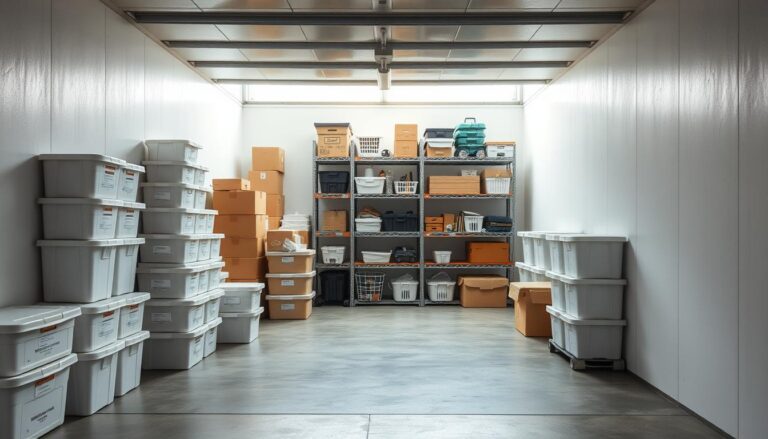How Much Can You Save By Recycling?
In the United States, 75% of waste can be recycled, but only 30% is. By recycling, you can cut down on waste disposal costs and even make money. Knowing how Save By Recycling helps you make better choices.
Exploring recycling shows how much you can save. It reduces energy use and can even earn you money. Adopting recycling habits leads to a greener lifestyle and financial gains.
Table of Contents
ToggleKey Takeaways
- Recycling can help you save money by reducing waste disposal costs
- Understanding recycling cost analysis is crucial to making informed decisions
- Reusing materials can significantly reduce your consumption of new materials
- You can earn money from recyclable materials like metal, plastic, and paper
- Adopting a recycling mindset can contribute to a more sustainable lifestyle
- Financial savings from reusing materials can be substantial
- How much money you can save from reusing and recycling depends on your recycling habits
Understanding the Financial Impact of Recycling
Recycling has big benefits for your wallet and the planet. By investing in recycling programs, you cut down on waste disposal costs. This helps save natural resources and brings long-term economic gains.
Adopting reuse strategies for saving money cuts your expenses. It also helps the environment by promoting a circular economy. Making choices to recycle and reuse supports a greener future.
- Reduced waste disposal costs
- Conservation of natural resources
- Creation of jobs in the recycling industry
Knowing how recycling affects your finances helps you support a sustainable environment.
Direct Financial Benefits
Recycling saves you money by lowering waste disposal costs. Recycling paper, plastic, and glass means less waste in landfills. This cuts down on your disposal expenses.
Indirect Cost Savings
Recycling also brings indirect savings. It saves natural resources and reduces the need for new materials. This lowers production costs and eases the economic load of waste management.
How Much Money Can I Save From Reusing and Recycling?
Use a savings calculator for recycling to see how much you can save. This tool lets you calculate savings from recycling. It shows where you can cut down on waste and save cash.
Reusing items has many benefits. It helps reduce waste, saves natural resources, and cuts costs. Ways to reuse include composting, using reusable bags, and recycling paper and cardboard. Here are some ways to save money:
- Composting food waste can save you up to $100 per year on fertilizers and soil conditioners.
- Using reusable bags and containers can save you up to $50 per year on disposable bags and containers.
- Recycling paper and cardboard can save you up to $20 per year on paper products.
By making these simple changes, you can save money and help the environment. Use a savings calculator for recycling to track your savings and stay motivated.
Start reusing and recycling today. You’ll see the benefits for yourself. With a bit of creativity and effort, you can make a big difference for your wallet and the planet.
| Item | Annual Savings |
|---|---|
| Composting | $100 |
| Reusable bags and containers | $50 |
| Recycling paper and cardboard | $20 |
Getting Started with Profitable Recycling
To start recycling, it’s key to know how it can save you money. Recycling can lead to big savings, and it’s important to understand this. First, set up a recycling system for your home. You might need to buy recycling bins and tools.
Think about what you can recycle, like metals, plastics, and glass. Knowing what’s valuable to recycle is crucial for saving money. For example, recycling aluminum cans and glass bottles can earn you cash. You can also sell paper and cardboard to recycling centers.
- Start small and gradually increase your recycling efforts
- Research local recycling programs and facilities
- Sort and separate materials correctly to avoid contamination
By following these tips, you can make a big difference in your wallet and the environment. Remember, every small step helps. Recycling is a great way to save money and reduce waste.
| Material | Recycling Value |
|---|---|
| Aluminum cans | $0.05 – $0.10 per can |
| Glass bottles | $0.05 – $0.10 per bottle |
| Paper and cardboard | $0.10 – $0.20 per pound |
Metal Recycling: Your Path to Extra Income
Metal recycling is a great way to make extra money. By looking into recycling costs, you can find out which metals are most profitable. These include aluminum, copper, and steel. It’s important to plan your budget for sustainability to buy the right tools and resources.
Recycling metals helps save natural resources and cuts down on pollution. For example, recycling aluminum uses much less energy than making new aluminum. This saves you money and helps the planet. Start by collecting scrap metal at home or in your community and sell it to a recycling center.
Here are some tips for metal recycling:
- Sort metals by type to ensure efficient processing
- Remove any contaminants or debris from the metals
- Research local recycling centers to find the best prices for your materials
By following these tips and doing regular cost analysis, you can make more money from recycling metals. Always remember to budget for sustainability to keep your recycling business going strong.
Plastic Recycling Economics
Looking to cut down on waste and save money? Plastic recycling economics can help. By reusing and recycling, you can save money and protect the environment. Recycling programs are a good place to start, with many options available.
Joining bottle deposit programs is a simple way to recycle and earn cash. You can collect and return cans and bottles for money. Bulk plastic recycling is another option, ideal for businesses or large communities. It’s efficient and cost-effective.
Bottle Deposit Programs
Bottle deposit programs boost recycling and cut down on waste. They let you earn money by recycling cans and bottles. States with these programs see a big jump in recycling rates.
Bulk Plastic Recycling
Bulk plastic recycling is a smart way to save money and reduce waste. It involves processing large amounts of plastic, which is more efficient than individual recycling. Investing in these programs helps save resources and cut down on waste.
Reusable Plastic Alternatives
Using reusable plastic items is another smart move. Bags, containers, and water bottles can replace single-use plastics. This not only cuts down on waste but also saves you money in the long run.
By adopting reuse strategies and investing in recycling, you can make a big difference. Whether it’s through bottle deposit programs, bulk recycling, or reusable items, you’ll save money and help the environment.
| Recycling Method | Benefits |
|---|---|
| Bottle Deposit Programs | Earn money, conserve natural resources |
| Bulk Plastic Recycling | Efficient, cost-effective, reduces waste |
| Reusable Plastic Alternatives | Reduces waste, saves money, conserves natural resources |
Paper and Cardboard: Hidden Money Makers
Looking into how much money can i save from reusing and recycling reveals the value of paper and cardboard. These items are common in homes and businesses. Recycling them can save a lot of money.
Newspaper, cardboard boxes, and junk mail are great for recycling. They help save natural resources and cut down on pollution. Many places also pay for recycling these items.
Here are some ways to make money from recycling paper and cardboard:
- Sell your recyclables to a local recycling center
- Participate in a community recycling program that offers rebates or incentives
- Use recycled paper and cardboard to create new products, such as crafts or packaging materials
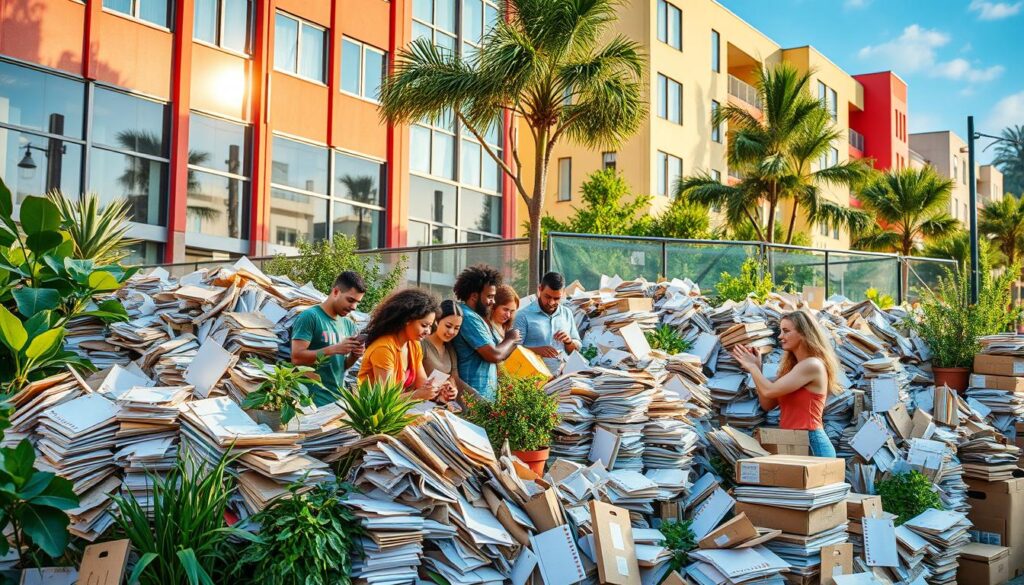
Recycling paper and cardboard can save money and help the planet. Next time you’re about to throw something away, think about recycling. You might be surprised at the savings.
| Material | Recycling Rate | Potential Earnings |
|---|---|---|
| Paper | 70% | $0.05 per pound |
| Cardboard | 80% | $0.10 per pound |
Electronics Recycling: Maximum Return on Investment
Looking to get more from recycling? Think about electronics recycling. It’s a big way to save money. Use a recycling savings calculator to figure out how much you can save.
The electronics recycling market is booming. It offers many chances for people and businesses to earn. You can sell or trade in old gadgets to make money.
Selling Used Electronics
Selling used electronics is a common way to earn. You can sell to refurbishers, recyclers, or online buyers. To get a good price, check the market value and compare offers.
Trading In Old Devices
Trading in old devices is another money-making option. Many companies offer trade-in programs. You can get new gadgets or gift cards. Use a recycling savings calculator to see what your old devices are worth.
Recycling electronics not only saves you money but also helps the planet. So, look into recycling programs today. Make the most of your old gadgets.
Household Items: Reuse Strategies for Major Savings
Reusing household items can greatly reduce waste and save natural resources. This is one of the benefits of reusing household items. It also helps you save money by not buying new things as often. But how much money can you save by recycling and reusing household items? The savings depend on the items and how often you reuse them.
Items like furniture, appliances, and clothes can be reused. They can be given a new life or recycled. For instance, an old chair can be fixed up and used again. An old appliance can be recycled for its metal parts.
To start reusing household items, try these strategies:
- Donate gently used items to local charities or thrift stores
- Sell items through online marketplaces or garage sales
- Repurpose items for new uses, such as turning an old jar into a planter
Using these strategies can help you save money and reduce waste. Always think about the benefits of reusing household items and how much money can you save by recycling when deciding what to do with old items.
| Item | Reuse Strategy | Potential Savings |
|---|---|---|
| Furniture | Refurbish and resell | $100-$500 |
| Appliances | Recycle for metal components | $50-$200 |
| Clothing | Donate or sell through online marketplaces | $20-$100 |
Community Recycling Programs and Incentives
Looking to reduce your environmental impact and save money? Join community recycling programs. These efforts can greatly help your wallet and the planet. By recycling, you cut down on waste, save resources, and might even get rewards.
Local governments and private companies offer rebates for recycling. You can get discounts or rewards for recycling plastics, glass, or paper. To find out what’s available near you, try:
- Checking with your local government for rebate programs
- Researching private recycling companies in your area
- Looking for community recycling events or initiatives
Joining these programs helps you save money and supports a greener future. Every small step we take can make a big difference.
Explore community recycling programs today. See how recycling can benefit you and your community.
| Program Type | Description | Benefits |
|---|---|---|
| Local Government Rebates | Rebates for recycling certain materials | Financial savings, reduced waste |
| Private Recycling Company Programs | Incentives for recycling, such as discounts or rewards | Financial savings, increased recycling rates |
| Community Recycling Events | Events or initiatives to promote recycling and sustainability | Education, community engagement, increased recycling rates |
Tracking Your Recycling Savings
Starting your recycling journey means tracking your progress and savings. This helps you see where you can do better and make smart choices. It also ensures your recycling is good for the planet and your wallet.
There are many ways to keep track of your recycling savings. You can use digital tools and apps. These tools help you monitor your recycling, set goals, and get reminders.
- Mobile apps that track your recycling habits and provide personalized recommendations
- Online platforms that allow you to set and achieve recycling goals
- Spreadsheets that help you calculate your recycling cost analysis and budget for sustainability
Digital Tools and Apps
Digital tools and apps make tracking your recycling easy. They help you stay organized, set reminders, and get notifications. Using these tools makes your recycling cost analysis more efficient.
Record Keeping Methods
There are also other ways to track your recycling savings. You can:
- Keep a recycling journal to track your progress and identify areas for improvement
- Use a spreadsheet to calculate your recycling cost analysis and budget for sustainability
- Create a recycling calendar to stay on track and set reminders
Using these methods helps you track your recycling savings and make smart budgeting choices. Always review and improve your recycling approach to get the best results.
Business Opportunities in Recycling
Exploring recycling opens up many business chances. You can invest in recycling programs and find ways to save money. This way, you help the environment and make money too. Recycling is good for the planet and can be very profitable.
Some key areas to consider when investing in recycling programs include:
- Developing reuse strategies for saving money on materials and resources
- Creating partnerships with local businesses and organizations to promote recycling initiatives
- Investing in recycling infrastructure, such as facilities and equipment, to support efficient recycling processes
By adopting reuse strategies, you can lessen your environmental impact. This makes a big difference in your community. Recycling is a smart and green business move.
Looking into recycling, you’ll see it’s good for your wallet and the planet. Sustainable practices and less waste mean a successful business. It’s good for you and your community.
Common Mistakes That Reduce Recycling Profits
Many people ask, “How much money can I save from reusing and recycling?” However, some common mistakes can cut down on recycling profits. One big mistake is mixing non-recyclable materials with recyclable ones.
Another error is using poor collection methods. This can greatly reduce the money you save from recycling. To fix this, make sure to sort materials right and use effective collection methods. This way, you can save more money and help the environment.
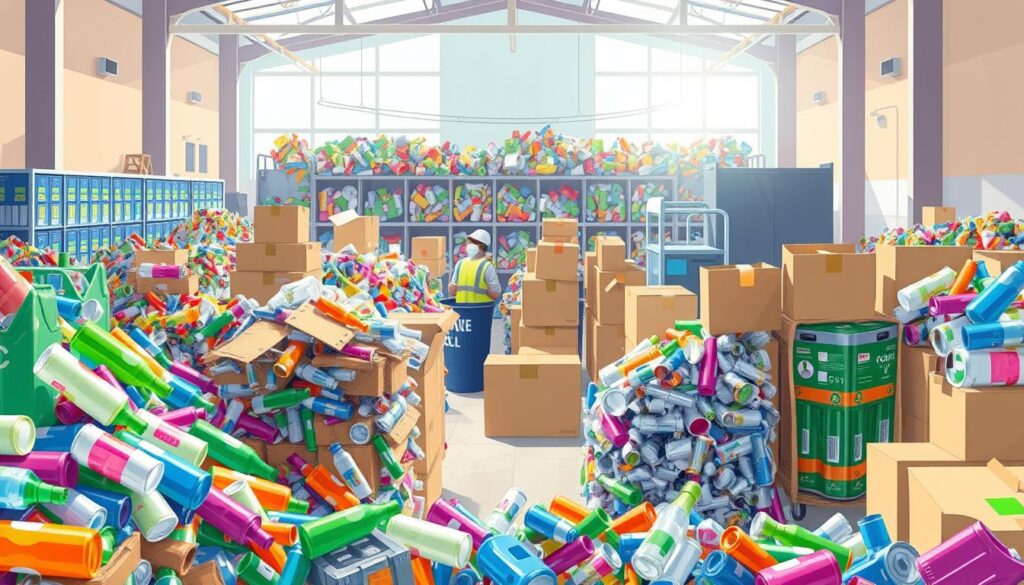
- Not separating materials correctly
- Using inefficient collection methods
- Not participating in community recycling programs
By avoiding these mistakes, you can save more money from recycling. Plus, you’ll help the planet. Every little change in your recycling habits can add up. It leads to big savings and a greener future.
Future Trends in Recycling Economics
When thinking about recycling’s financial benefits, it’s key to look at future trends. A savings calculator for recycling helps you figure out how much you can save. The recycling world is always changing, with new tech and ideas to make recycling better and cheaper.
Watch for trends like artificial intelligence and machine learning making recycling smarter. Also, look out for more community-based recycling programs. These programs cut down on waste and help local economies. Keeping up with recycling trends helps you earn more from recycling and supports a greener future.
To begin, use a savings calculator for recycling. It helps you see where you can save more. Important things to think about include:
- Material type and quantity
- Recycling program fees and incentives
- Energy and water savings
Understanding these points and using a savings calculator helps you make better recycling choices. This way, you can lessen your environmental footprint and help create a more sustainable world.
Conclusion: Maximizing Your Recycling Revenue
Recycling can really help your wallet. By sorting, collecting, and selling recyclables, you can earn extra money. Plus, it’s good for the planet.
Think of recycling as a chance to make money, not just to help the environment. Keep track of your savings, look for local rewards, and find valuable recyclables. Every bit counts, and more recycling means more savings.
Invest in good recycling tools and stay up-to-date with recycling news. With some effort and the right attitude,recycling can be a profitable habit. Start recycling today and see your savings increase.

